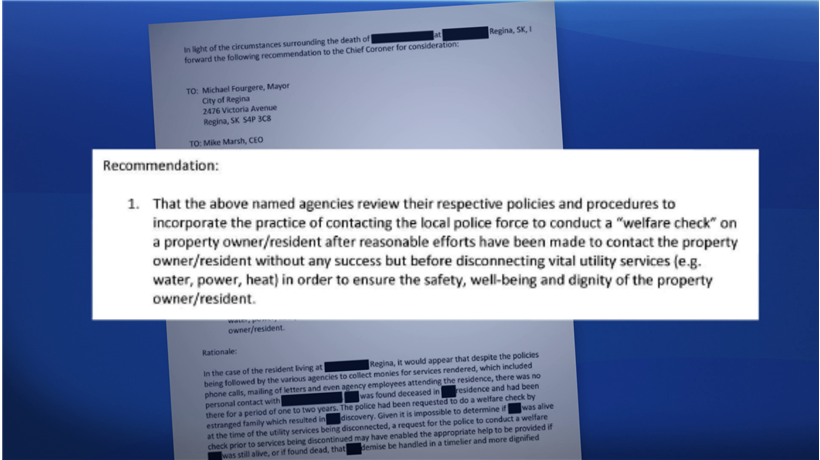For up to two years the remains of a Regina woman lay in her bed, festering away from sight. No one knew she had died, some didn’t even know she was there.

“Occasionally we will come into a scene where the body of the deceased is in an advanced stage of decomposition. This was – I would call – exceptional. It was well beyond decomposition, to the point where the only remains were bones,” Regina Police Service Supt. Corey Zaharuk said.
In April of 2017, Victoria McGinley was called to a home where Regina police had found a body in an “advanced sate of decomposition,” but upon arriving in the bedroom McGinley found a very different scene.
The state of the home was “unique” according to Zarahuk. “There were a lot of items in the home, it was jam-packed. One of the descriptions of the lady that lived in the home was that she was a hoarder,” he said.
McGinley described making her way to the bedroom as “an extreme workout,” but the horrors of clutter and dejected furniture on her way paled in comparison to what she found there.
“It was possible to see a skull resting on the pillow with the rest of the body covered in bedding,” McGinley wrote in an article shared with Global News.
“The decedent was reduced to a skeleton with little to no connective tissue, muscle or skin left. There was evidence of some animal activity…and large mouse droppings,” she continued.
Zaharuk has spent over two decades policing, but this situation – this length of time – was unprecedented.
“I’ve never seen anything like this before. We often encounter bodies in homes and occasionally we see them in an advanced stage of decomposition, but never to this extent,” he stated.
The cause, and time of the woman’s death was never determined.
In her coroner’s report, McGinely wrote the body had been there “for a period of one or two years,” and that local neighbours had not seen the woman for as long as two years; some didn’t even know the house was occupied.
But the report also shows there were attempts to contact the woman, even people going to the home – potentially after her death.
McGinley recommended a change in policy: that police conduct welfare checks when the property owner can’t be contacted.
“What we did, was we developed better processes with utility companies and the City of Regina to make sure that we don’t come across this situation again,” Zaharuk said.
In an emailed statement SaskEnergy said, “SaskEnergy has agreed that for winter disconnects, it will now also ensure that a police welfare check is done prior to natural gas service being disconnected,” but added that winter disconnects are rare and that they already had implemented policy prior to the recommendations where “contact has to be made directly with the customer – either over the phone or in person” before they could disconnect services.

Get breaking National news
SaskEnergy also noted that they had disconnected services to the home several years prior to the one to two year period when the woman died.
SaskPower said they were fine-tuning processes to ensure they “keep an eye out for signs of distress, and contact the police or RCMP to perform a wellness check as needed.”
The city noted they had implemented changes that include “additional attempts to make in person contact and follow up post disconnection of service that may, if warranted, result in the City directly contacting RPS to complete a welfare check up.”
But Regina police went one step further. They created the “Be a Good Neighbour” campaign to ensure that situations like this are as uncommon as possible.
“We often see that neighbours – after the fact – had some concerns, they hadn’t seen their fellow neighbour in a while, and they weren’t sure what to do,” Zaharuk said.
“Our message is very simple here, if you have some concerns, if you neighbour’s yard, home or something about them is not quite right, and you feel like they’re deserving of a welfare check and you maybe don’t want to do it yourself, call us and we’ll do a welfare check on that person,” he continued.
According to Zaharuk common signs include mail that hasn’t been collected for some time, yard work – such as lawn mowing or snow shoveling – that is being ignored for longer periods than normal, or distressed pets in the yard.
Michel Sorensen, the program coordinator for Saskatchewan Seniors Mechanism, says that isolation – and in particular senior isolation – is problematic throughout the province.
“Unfortunately, senior isolation is a big problem in our province. If you do have an older adult as your neighbour check in on them. Get to know them and let them know that you could be a safe place if they do have any problems” Sorensen said.
She says many seniors feel isolated due to a poor support system, and notes that those suffering from Alzheimer’s or dementia are at particular risk.
Editors note: This story has been updated to show SaskEnergy cut services to the home several years prior to the victim’s death









Comments